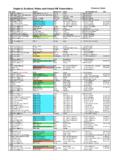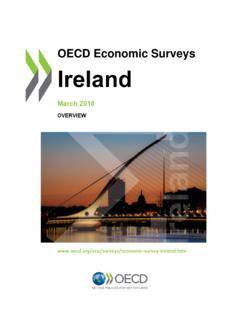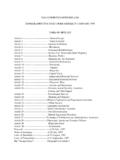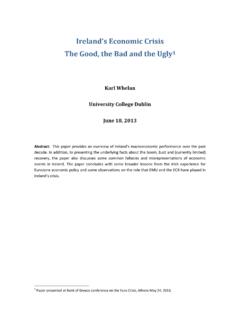Transcription of OECD Thematic Review of Early Childhood …
1 OECD Thematic Review of Early Childhood education and care background Report ireland Prepared by Carmel Corrigan for The Department of education and Science i Acknowledgements Many people contributed to this report by sharing their knowledge, experience and views. In the first instance, my thanks go to the members of the Editorial Group John Fanning of the Department of education and Science, Peter Archer of St. Patrick s College, Drumcondra, Noir n Hayes of Dublin Institute of Technology and Heino Schonfeld of the Centre for Early Childhood Development and education . The inputs of Liam MacMathuna and Richard Byrne are also appreciated. I would like to thank the representatives of Area Development Management, the Childcare Division of the Department of Justice, Equality and Law Reform, the National Co-ordinating Childcare Committee, the Inspectorate Unit and the Social Inclusion Unit of the Department of education and Science, the Department of Health and Children, the National Children s Office, the National Council for Curriculum and Assessment, the National Childcare Voluntary Organisations and the Centre for Early Childhood Development and education that attended meetings and provided essential information and insights in to the issues addressed.
2 The contributions of those organisations that made submissions the Combat Poverty Agency, An Comhchoiste Reamhscola ochta, the Irish National Teachers Organisation, the Catholic Primary School Managers Association and the Department of Community, Rural and Gaeltacht Affairs are also gratefully acknowledged. Thanks are also owed to the many organisations and sections within Government Departments who provided invariably prompt replies to an array of requests for information. I would particularly like to thank my colleagues in the Centre for Social and Educational Research for their help and support in this work. Finally, my heartfelt thanks go to Antoinette Talbot of the Strategic Policy Unit of the Department of education and Science who contributed in no small part to this report. Not only did she prove to be an administrator of some talent, but also proved extremely capable in the drafting and editing of text as well as a welcomed source of professional and personal support.
3 Ii Glossary of Terms After-school and Out-of-School care : this refers to care provided for school-going children outside of school hours, including after-school hours and during school holidays. Early Start Programme: this is a programme aimed at pre-school children in disadvantaged areas aged three to 4 years. Childminders: these are private individuals who provide care for children predominantly in their own [minder s] home, providing full-day, part-time and after-school care to children of a wide variety of ages. Infant Classes in Primary Schools: these are the first two years of primary school education and are usually comprised of 4, 5 and 6 year olds. This category also includes the small number of special infant classes that cater for children with special learning needs that are attached to some ordinary primary schools. Naionrai: these provide pre-school education through the medium of Irish and cater for children aged 3 to 6 years.
4 Nurseries and Cr ches: these typically provide full day services and many cater for children from 2 to 3 months up to school-going age. In addition, many of these provide after-school care for children of school going age. Parent and Toddler Groups: typically these cater for children from birth to 3 years, are attached to other childcare services such as pre-schools or cr ches and offer opportunities for play for children and social interaction and informal support to parents. Play Groups and Pre-schools: these usually provide sessional services (that is, less than three hours per child per day) for children aged from 3 to 4 or 5 years. Pre-School for Travellers: these cater for pre-school children from the Traveller Community. Special Schools: this refers to schools that cater exclusively for children with learning and/or physical disabilities.
5 Iii Abbreviations ADM Area Development Management Ltd Bachelor of education CECDE Centre for Early Childhood Development and education CLAR Ceantair Laga Ard-Riachtanais CSER Centre for Social and Educational Research CDB County Development Board CEB County Enterprise Board DCRGA Department of Community, Rural and Gaeltacht Affairs DES Department of education and Science DELG Department of the Environment and Local Government DETE Department of Enterprise, Trade and Employment DHC Department of Health and Children DIT Dublin Institute of Technology DJELR Department of Justice, Equality and Law Reform DSFA Department of Social and Family Affairs EOCP Equal Opportunities Childcare Programme ERC Educational Research Centre ESF European Social Fund FETAC Further education and Training Awards Council HETAC Higher education and Training Awards Council HSCL Home School Community Liaison ICTU Irish Congress of Trade Unions INTO Irish National Teacher s Organisation ISPCC Irish Society for the Prevention of Cruelty to Children NAPS National Anti-Poverty Strategy NCCA National Council for Curriculum and Assessment NCCC National Co-ordinating Childcare Committee NCNA National Children s Nurseries Association NCO National Children s Office NEPS National Educational Psychological Service NVCO National Voluntary Childcare Organisations RAPID Revitalising Areas by Planning.
6 Investment and Development SNO Special Needs Organiser VEC Vocational education Committee iv Acknowledgements i Glossary of Terms ii Abbreviations iii Table of Contents 1. CONTEXT AND CURRENT PROVISION 1 background TO ireland Geography 1 Population and Age Structure 1 Economic Growth and Changing Employment Patterns 2 The Changing Role of Women 3 Changing Family Size and Structure 5 OVERVIEW OF Early Childhood care AND education Children, Family and education in the Constitution 6 Changing Perceptions of Children.
7 The Emergence of a Rights Based Approach 7 Child Poverty in ireland 8 How Early Childhood education and care is Understood in ireland 10 The Irish education System 11 The Development of Early Childhood care and education Policy 13 Types and Coverage of Early Childhood education and care Provision 22 Provision for Children in Disadvantaged Areas 28 Institutional Supports for Early Childhood care and education 32 2. POLICY APPROACHES 40 REGULATIONS Regulating Childcare Provision 40 Regulating Primary education 42 STAFFING Staffing Issues in the Childcare Sector 43 Staffing Issues in Primary education 46 PROGRAMME CONTENT AND IMPLEMENTATION The Primary School Curriculum 47 Curricular Guidelines for Good Practice in Early Start 49 A New Framework for Early Childhood Learning 49 A Curriculum for Children with Special Needs
8 50 v Family Engagement and Support The Involvement of Parents in Early education and Childcare 51 Family Friendly Policies: Reconciling Work and Family Life 53 FUNDING DES Funded Pre-School Services Core Funding for Primary education 56 Additional Funding for Primary education 56 Funding for Childcare 57 Supports to Parents 58 3. POLICY CONCERNS 60 QUALITY Conceptualising Quality: Indicators and Criteria 60 Measuring Quality 62 Quality Initiatives under the EOCP 64 ACCESS Availability of Places: Supply and Demand 66 Location of Services 67 Affordability 69 Equality of Access.
9 Reflecting Diversity 69 CO-ORDINATION Co-ordination Structures 70 Effective Co-ordination: Progress and Challenges 70 4. RESEARCH AND EVALUATION 73 Administrative Data 73 Research and Evaluation Studies 74 5. CONCLUDING COMMENTS & ASSESSMENTS 79 vi REFERENCES 84 Annex 1 The Irish education System 91 Annex 2 Principal Types of Early Childhood education and care Provision 92 Annex 3 The EOCP: Summary Tables 93 Annex 4 Primary School Programmes to Combat Educational Disadvantage 96 Annex 5 Departmental Responsibility for ECEC 101 Annex 6 QNHS Module on Childcare Arrangements 103 11.
10 CONTEXT AND CURRENT PROVISION background TO ireland Geography ireland is one of the smallest countries in Europe and occupies the most westerly, peripheral position. Geographically, the entire island is comprised of 32 counties, 26 of which make up the Republic of ireland , (commonly referred to as the South), and 6 of which go to make up Northern ireland (usually called the North), which forms part of the United Kingdom. This report is concerned with the Republic of ireland only, which will be referred to as ireland in the remainder of this report for ease of reading. ireland covers an area of some 70,282 square kilometres (27,136 square miles). It is comprised of 4 provinces: Leinster to the east, Connaught to the west, Munster to the south and Ulster, the majority of which (6 of nine counties) lie in Northern ireland . Regional differences that broadly correspond to provincial divisions are commonly acknowledged.

















